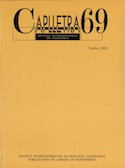Sagarra «sagarreja»? A Linguistic Analysis of Josep M. de Sagarra’s Translation of «Macbeth»
DOI:
https://doi.org/10.7203/caplletra.69.17265Keywords:
Josep M. de Sagarra, sagarrejar, William Shakespeare, Macbeth, linguistic analysis, translation Abstract
Abstract
The translations of Shakespeare’s plays by Josep M. de Sagarra marked a turning point regarding the previous translations of Shakespeare’s works into Catalan. This was mainly due to the number of translated plays (twenty-eight) and the fact that these translations were meant to be performed on stage. This paper reviews the main critical comments about Sagarra’s translations of Shakespeare’s plays. One of them is that some options in Sagarra’s texts sagarregen, that is, they contain more of Sagarra’s style than Shakespeare’s. The aim of this article is to refine the concept of sagarrejar and to identify the main characteristics of Sagarra’s way of translating Shakespeare. To do so, key linguistic aspects of his translation of Macbeth have been analysed: register, intensification, preferential words, addition and deletion of information, total changes of meaning and metre.
 Downloads
Downloads
Downloads
Published
How to Cite
-
Abstract402
-
PDF (Català)406
Issue
Section
License
Authors submitting work to Caplletra for publication must be the legitimate holder of the usage rights. Legitimacy for the purposes of publishing the work must also include images, tables, diagrams and any other materials that may complement the text, whether they are the author of such material or not.
Copyright: on publishing their work in the journal, the author grants Caplletra. Revista Internacional de Filologia usage rights (reproduction, distribution and public communication) for both the paper printed version and for the electronic version.
All work published in Caplletra is covered by the Creative Commons license type Attribution-NonCommercial-NoDerivatives 4.0 (CC BY-NC-ND 4.0).
RESPONSABILITY
Caplletra. Revista Internacional de Filologia does not necessarily identify with the points of view expressed in the papers it publishes.
Caplletra. Revista Internacional de Filologia accepts no responsibility whatsoever for any eventual infringement of intellectual property rights on the part of authors.






